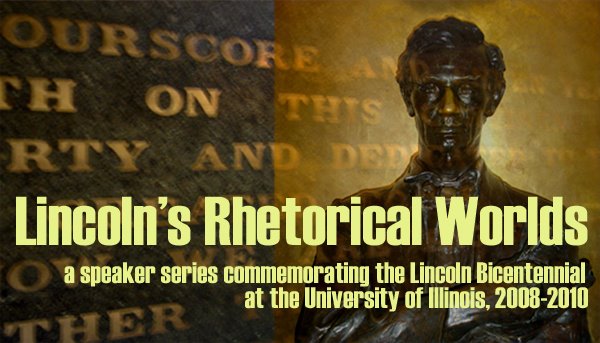Lincoln's Rhetorical Worlds is a yearlong speaker series that will bring to campus five prominent scholars of rhetoric and nineteenth century public culture. In free, public lectures, these scholars will examine Lincoln's complex discursive legacy and explore the rhetorical worlds of Lincoln's America.
Our five guest speakers will give public lectures, visit graduate and undergraduate courses on presidential rhetoric and Lincoln's legacy, and discuss their research with the interdisciplinary Rhetorical Studies Reading Group, sponsored by the Illinois Program for Research in the Humanities.
Fall 2008
Kirt Wilson, University of Minnesota: "Debating 'The Great Emancipator': Lincoln's Rhetoric and Our Collective Memory." Monday, Sept. 15, 7 pm 112 Gregory Hall
Professor Wilson is also scheduled to appear as a guest on "Focus 580," a local public radio program, on Monday, Sept. 15 at 11 am on AM-580.
Spring 2009
David Zarefsky, Northwestern University (Feb. 4-5, 2009; talk TBA)
Angela Ray, Northwestern University (March 4-6, 2009; talk TBA)
Susan Zaeske, University of Wisconsin (April 2009; talk TBA)
Fall 2009
Michael Leff, University of Memphis
As our foremost "rhetorical president," Lincoln provides an ideal case for examination of the ways that presidential communication frames and reflects American ideals and identities. Lincoln also serves as a point of departure for exploring the vivid rhetorical landscape of the 19th century United States, a world animated by discourses of slavery, religion, suffrage, war, and sectionalism (to name but a few); enabled by spaces for rhetorical training; constrained by the limitations of racism, sexism, and class politics; and vexed by the pragmatic challenges of governance. We are pleased to guide our campus and local communities in exploration of the social, cultural, political, aesthetic, and ethical aspects of Lincoln's Rhetorical Worlds.
The series is sponsored by the Offices of the Chancellor and Vice Chancellor for Public Engagement and the Department of Communication at the University of Illinois, in cooperation with the Lincoln Bicentennial Committee.
Questions? Contact lincolnrhetoric@gmail.com.


No comments:
Post a Comment